Key takeaways:
- Medical decision support systems (MDSS) enhance clinician decision-making by aggregating clinical data and providing evidence-based recommendations.
- Resilience in healthcare is vital for adapting to challenges and fosters a supportive culture that strengthens team performance.
- Continuous evaluation, collaboration, and the integration of patient values are essential principles of evidence-based practices that improve healthcare outcomes.
- Personal experiences and adaptability are critical in building resilience, emphasizing the importance of teamwork and reflective practices.
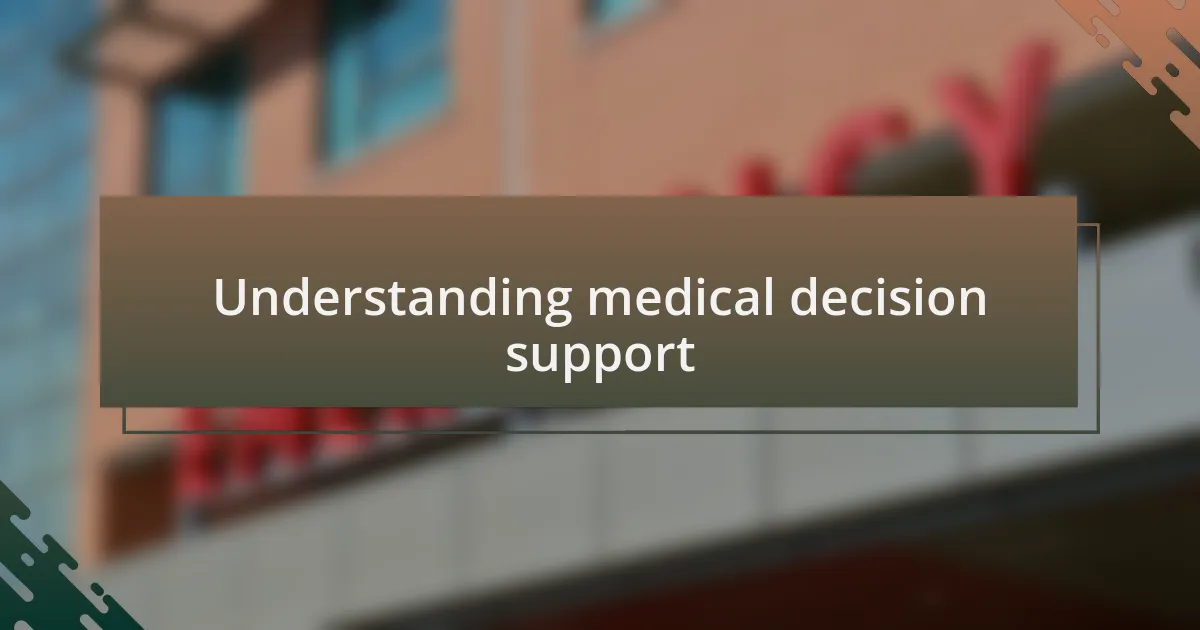
Understanding medical decision support
Medical decision support systems (MDSS) play a crucial role in today’s healthcare landscape. I remember the first time I witnessed a clinician utilize one of these systems during a complex case. It was fascinating to see how quickly they accessed relevant data, allowing them to make informed decisions that ultimately improved patient outcomes. How often do we find ourselves overwhelmed by choices? MDSS simplifies this process by providing evidence-based recommendations tailored to individual patient needs.
These systems aggregate vast amounts of clinical data, guiding healthcare professionals through complex decision-making. I once felt lost trying to navigate treatment options for a loved one, and it struck me how vital it is for providers to have reliable tools at their fingertips. They ensure that decisions are not just instinctual but grounded in the latest research. Isn’t it incredible to think that technology can enhance human intuition with so much relevant information?
At the heart of MDSS is the continuous feedback loop that helps refine and improve recommendations over time. From my perspective, this adaptability is where the true power lies; as more data is collected, the system evolves, becoming even more precise in its guidance. This ongoing learning process raises an essential question for all of us: How can we further integrate such intelligent systems into our daily practices to enhance healthcare quality and patient safety?
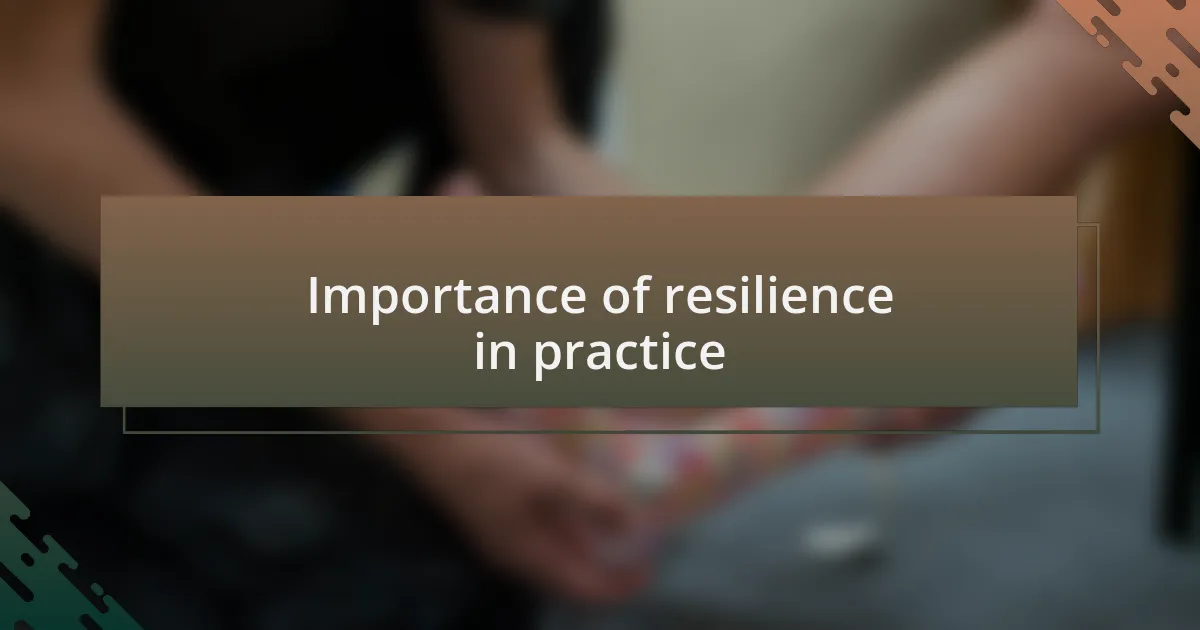
Importance of resilience in practice
Resilience in practice is crucial as it enables healthcare professionals to adapt amidst the unpredictable nature of patient care. I recall a particularly challenging shift when a sudden influx of patients pushed the team to their limits. Instead of collapsing under pressure, we rallied together, relying on our training and support systems. That experience underscored how resilience not only sustains individual practitioners but also strengthens the entire team’s ability to deliver quality care.
Being resilient means embracing both successes and setbacks in a healthcare environment that is ever-changing. I remember a time when a decision I made didn’t lead to the best outcome; rather than feeling defeated, I viewed it as an opportunity to learn. This mindset can transform how we approach future decisions and enhance our ability to make evidence-based choices, especially when events unfold unexpectedly.
Moreover, resilience fosters a culture of support, which is vital for long-term well-being in medical practice. I find that when colleagues openly share their challenges, it creates an environment where we can all thrive. Isn’t it empowering to know that fostering resilience isn’t just about personal strength but also about building a collective spirit? By prioritizing resilience, we not only improve decision-making but also create a healthier work atmosphere for everyone involved.
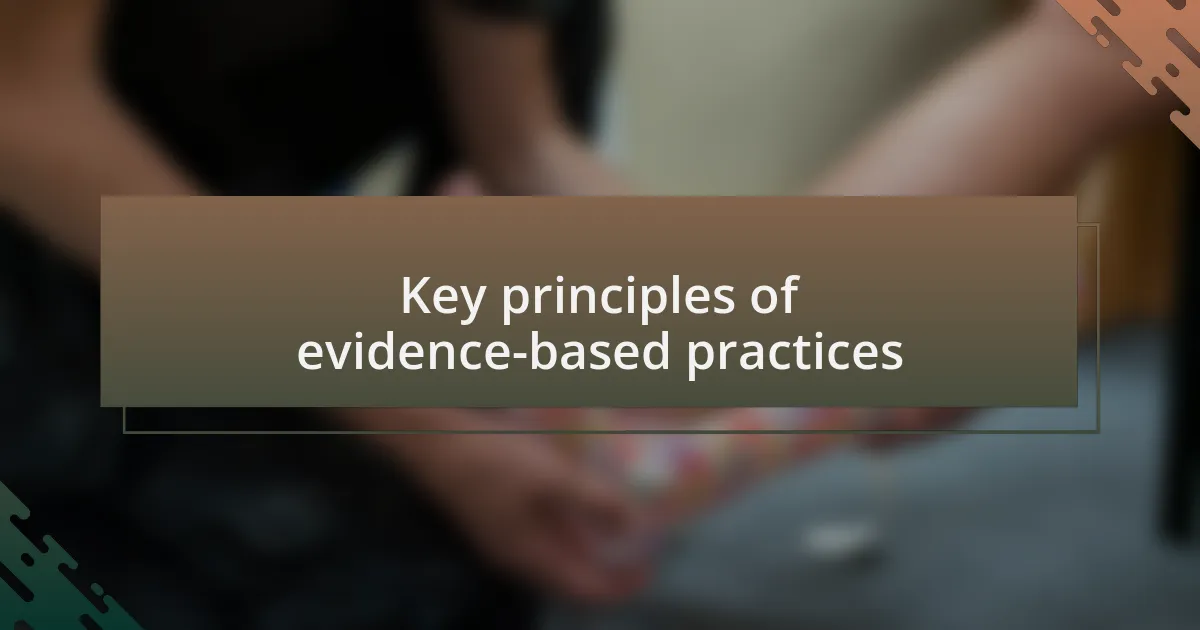
Key principles of evidence-based practices
Evidence-based practices hinge on several key principles that ensure the care we provide is not only effective but also tailored to individual patient needs. One central tenet is the integration of the best available research evidence with clinical expertise. I frequently think back to a situation where a complicated case required not just my knowledge but also the latest guidelines and studies. This blending of personal experience and current research shaped the successful treatment path we took.
Another crucial principle involves patient values and preferences. I remember engaging with a patient who had unique beliefs about their treatment options. It struck me how incorporating their perspective into the decision-making process transformed not just their adherence to the treatment, but also their overall satisfaction. How often do we let patient voices dictate our choices in healthcare? In my experience, acknowledging these values not only deepens the trust in our relationships but also enhances the effectiveness of our interventions.
Finally, continuous evaluation and improvement is foundational to evidence-based practices. I often reflect on how our team regularly reviews cases to identify areas for enhancement, akin to a sports team analyzing game footage. This practice fosters an ongoing learning environment that encourages adaptation and adoption of fresh approaches. Isn’t it captivating to think that even a small tweak in practice can significantly influence patient outcomes? By embracing these principles, we fortify our commitment to delivering high-quality care while remaining responsive to the dynamic landscape of healthcare.
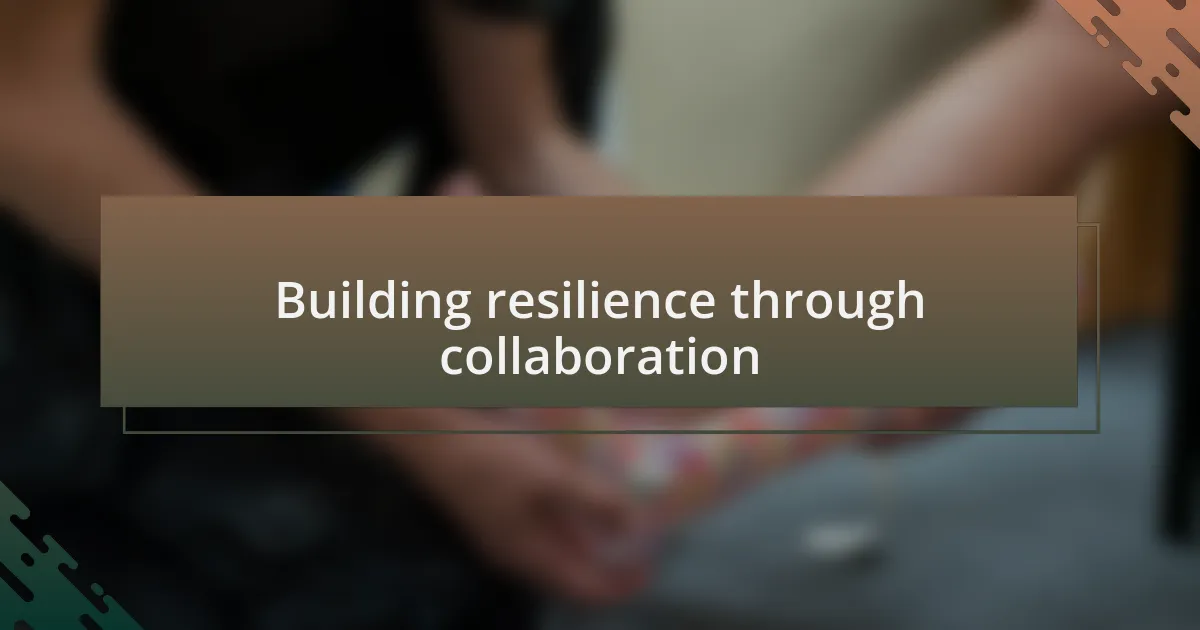
Building resilience through collaboration
Collaboration is at the heart of resilience-building in evidence-based practices. I’ll never forget when we faced a particularly challenging case involving a multi-disciplinary team. Each member brought a unique perspective and set of skills, from the radiologist to the social worker. This melting pot of ideas not only enriched our decision-making but also instilled a shared commitment to finding the best solutions. Have you ever realized how much easier it is to navigate complex decisions when you have a diverse group of experts brainstorming together?
My experience has shown me that the act of working closely with colleagues can spark creativity and innovation. During a difficult treatment planning session, I suggested an unconventional approach based on research I had recently read. To my surprise, others were inspired by that idea, leading to a breakthrough that we hadn’t anticipated. Collaboration thus becomes a catalyst for resilience, as it allows us to bounce ideas off one another and adapt practices to better suit our patients’ needs. Don’t you think it’s intriguing how collaboration can turn potential setbacks into opportunities for growth?
Moreover, establishing strong relationships with colleagues fosters a support network that is invaluable during challenging times. I remember when a colleague was particularly overwhelmed with their workload. A quick conversation led us to share resources and strategies that eased the burden for both of us. This supportive environment not only enhances team morale but also cultivates resilience, as we are reminded that we’re not alone in our challenges. Isn’t it reassuring to know that through collaboration, we can bolster not just our own resilience but that of our entire team?
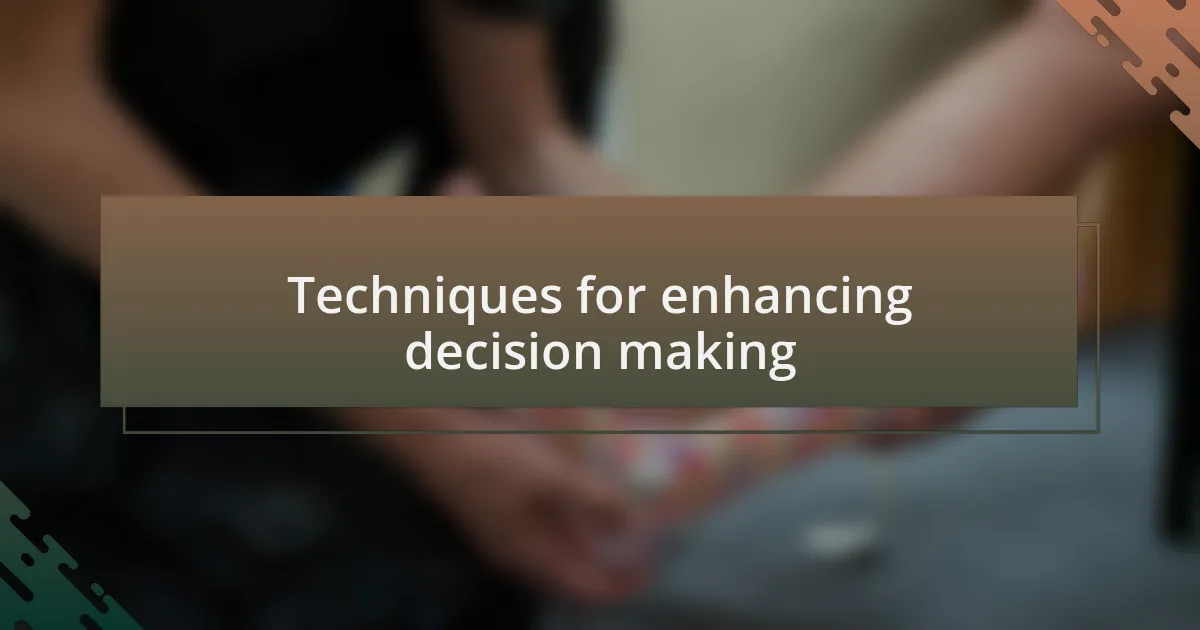
Techniques for enhancing decision making
In my experience, one powerful technique for enhancing decision-making is the use of structured decision-making frameworks. For instance, when confronted with a complex case, I’ve utilized a simple matrix to weigh the pros and cons of various treatment options. This approach not only clarifies our priorities but also ensures that everyone’s input is systematically considered, making it much easier to reach a consensus. Have you ever felt overwhelmed by the number of choices available? A framework can help simplify that process.
Another effective technique that I’ve found invaluable is storytelling within our discussions. When we share experiences related to similar cases, it brings a human element to the decision-making process, helping to contextualize our choices. I recall a time when a colleague shared a story about a patient who thrived under a specific treatment plan. It painted a vivid picture that influenced our final decision, reminding us of the real lives affected by our clinical choices. Isn’t it striking how a narrative can drive home the importance of a decision and resonate on a personal level?
Additionally, incorporating technology can significantly enhance our decision-making capabilities. In one project, I introduced a clinical decision support tool that integrated evidence-based guidelines with patient data. I’ve seen firsthand how this technology not only streamlines the process but also reduces the risk of error. It raises an interesting question: how often do we fully leverage the digital resources at our disposal to aid our clinical judgment? By utilizing these tools, we can make more informed and precise decisions, ultimately improving patient care.
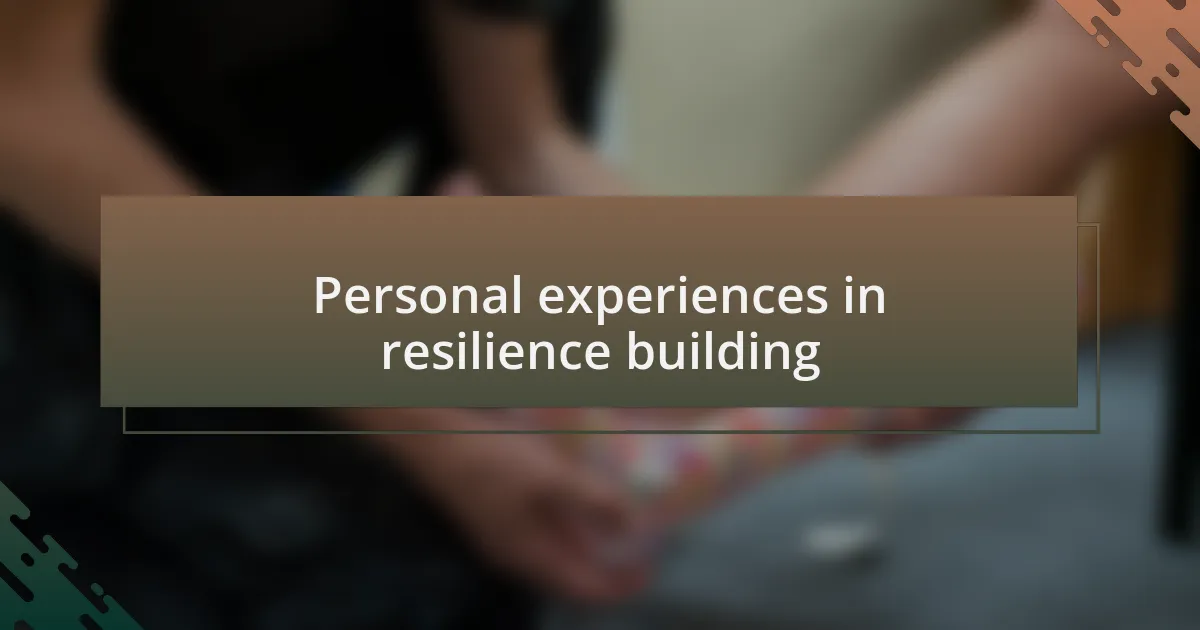
Personal experiences in resilience building
Building resilience has been a journey shaped by my personal experiences, particularly during challenging cases. I recall a particularly tough period when I had to manage a patient whose prognosis was grim. Instead of succumbing to the weight of the situation, I sought support from colleagues who had faced similar dilemmas. This communal effort not only fostered my resilience but also deepened our professional bonds. Have you ever leaned on your team during a tough moment? It’s remarkable how collective wisdom can energize our resolve.
One aspect of resilience that stands out in my mind is the importance of self-reflection. After navigating several demanding cases, I started dedicating time to assess my emotional responses. I remember sitting down after an exhausting week, journaling about what went well and what I could improve. This practice paved the way for personal growth, allowing me to view setbacks as opportunities for learning rather than failures. Don’t you think that reflecting on our experiences can lead to a more balanced perspective on our work?
Furthermore, I’ve come to appreciate the power of adaptability in building resilience. I vividly recall a moment when our treatment protocols changed rapidly due to new evidence. Instead of feeling disoriented, I embraced the situation by exploring alternative strategies and updating my knowledge base. This shift in mindset not only helped me navigate the new landscape but also inspired my team to embrace flexibility. Isn’t it fascinating how embracing uncertainty can actually strengthen our resilience in the long run?